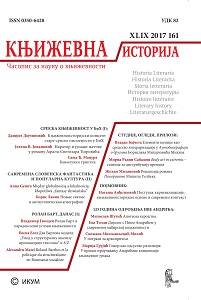Дијалог с Ивом Андрићем у савременој мађарској књижевности
A Dialogue with Ivo Andrić in the Contemporary Hungarian Literature
Author(s): Éva ToldiSubject(s): Serbian Literature
Published by: Институт за књижевност и уметност
Summary/Abstract: The paper gives an insight into a segment of the reception of Ivo Andrić in the Hungarian literature. It focuses in particular on the contemporary Hungarian literary context, but it also looks back at the beginnings, which can be seen as the forerunners of the present-day phenomena. It considers the processes of discovery,presentation and adaptation from the viewpoint of dialogicity. In addition, the paper focuses on how one’s own and the foreign experiences are acquired, how this foreign writer, Andrić, has become familiar, and which elements of his work have proved capable of engaging in a dialogue in the Hungarian literature. The process of turning Andrić into ones’ own started in the regional Hungarian literature in Vojvodina, when writers started reading Andrić’s short stories as the realization of their own concept of couleur local. The reception of the Nobel Prize-winning author was founded on a wide spirit of familiarization reaching far beyond the Hungarian literature. It took on an ideological approach when read as the realization of experiences resulting from the common fate. In the modern Hungarian literature,it has met the sensibility of the middle-age generation, which has developed a newform of historical novel looking upon the literary tradition in the spirit of rewriting.They rewrite, develop or expand the works of the 19th-century Hungarian literature and also read Andrić’s work analytically and implement a variety of modalities in the dialogues. The paper shows the formations of the narrative technical and stylistic dialogues, the development or expansion and intertextual borrowing,and also looks at the aspects of translation. By presenting László Márton’s textual interpretation and analyzing László Darvasi’s as well as Attila Balázs’ novels, the author shows the processes through which Andrić has become writable – in the sense of Barthes – in another culture.
Journal: Књижевна историја
- Issue Year: 49/2017
- Issue No: 161
- Page Range: 133-154
- Page Count: 20
- Language: Serbian

